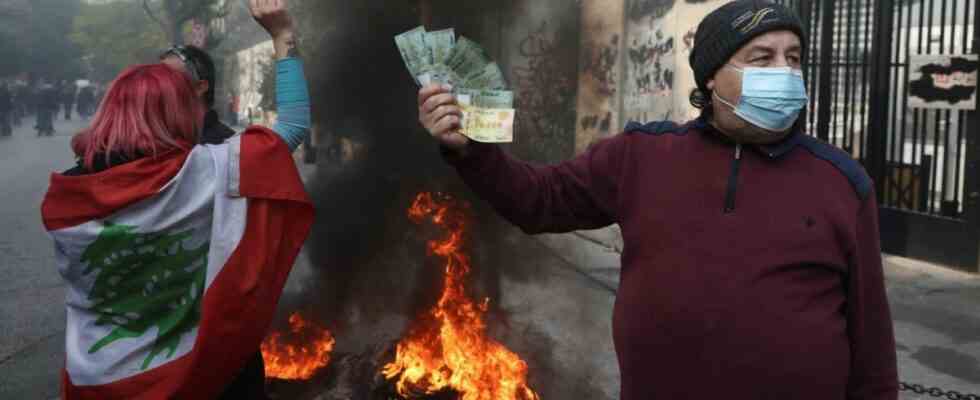Delegations from six countries want to find a way out of the political and financial crisis that has been gripping Lebanon since 2019 in Paris on Monday. Egypt, Saudi Arabia, Qatar, the US and France are likely to put heavy pressure behind closed doors on government officials and the delegations of the various political camps from Lebanon. Because the current political vacuum is preventing the drastic economic reforms demanded by the International Monetary Fund (IMF). The Lebanese pound has lost more than 95 percent of its value in three years.
At the last international Lebanon conference convened by French President Emmanuel Macron in Beirut, the participating countries pledged $370 million in humanitarian aid. The whereabouts of the funds is largely unclear. According to a recent study by the World Bank, more than 70 percent of the 5.6 million Lebanese live below the poverty line in their homeland and have less than 14 dollars a day. But since former President Michel Aoun left the presidential palace in October at the end of his mandate, political apathy has prevailed. Many Lebanese try to emigrate because of the daily power cuts lasting several hours and the loss of their savings.
During her visit to the Saudi Arabian capital, Riyadh, French Foreign Minister Catherine Colonna warned of the catastrophic impact of the crisis on the entire region. “The economic situation in Lebanon is surreal and unique, even for us Lebanese who are used to the crisis,” says economics expert Karim Emile Bitar from Beirut. “The World Bank analyzed the situation correctly. Even after the financial collapse in 2019, the bailout plan presented by the IMF could have protected us from losing our savings. But some politicians, together with shareholders of private companies and the head of the central bank, have the international Efforts to save Lebanon torpedoed.”
The head of the central bank is under investigation
Experts like Bitar are particularly worried about the almost 70 percent drop in gross domestic product. “In other countries, such a decline in productivity has led to a wave of strikes and eventually a spiral of violence,” Bitar said. In Paris, however, the focus will probably not be on the financial crisis that has been extensively analyzed by the World Bank and the International Monetary Fund. Macron hopes to agree on a presidential candidate acceptable to all factions and a new central bank governor.
Riyadh Salameh, the longtime head of the central bank, is under investigation in six European countries for corruption and money laundering. Allegedly, $325 million flowed from the central bank into a corporate account in the Virgin Islands that was linked to Salameh’s brother. Karim Bitar criticizes that the current political elite is trying to extend Salameh’s term of office, which ends in June, in order to prevent investigations into her crooked dealings with the central bank. A pretext for this would be the political vacuum created by the vacancy in the presidency.
Until two years ago, European countries also saw Riyadh Salameh as a factor of stability. However, the exposure of the illicit flow of money from central bank accounts abroad has led to a permanent loss of confidence in all institutions among Lebanese and diplomats alike. Now it is the remittances of the more than eight million Lebanese who have emigrated that are saving the country. In the nightlife districts, the reopened bars and hotels are even full again. “We just ignore the Lebanese pound and the bank, everything now works in cash and on a dollar basis,” says a restaurant owner in Gemmayzeh district.
Qatar is pulling the strings in Lebanon
Saudi Arabia and other Gulf states have scaled back investments and political ambitions. The exception is Qatar, which, alongside the former colonial power France, has blossomed into the most influential power broker in Lebanon. Lebanese politicians regularly travel to Doha, which has also paid the poorly equipped Lebanese army several times.
The state-owned energy giant Qatar Energy took over the Russian stake in a consortium of companies that intends to extract gas off the Lebanese coast in the future. With rare unity, the otherwise hostile political camps approved a contract with Israel for production from the huge gas field last year. Qatar’s engagement is changing the complicated balance of power in the multi-religious state. While Saudi Arabia openly supported the Sunni militias and parties and fought the influence of the Iran-friendly Shia Hezbollah militia, Qatar is seen as a partner of Iran and Hezbollah, Israel’s arch-enemies. At the same time, Hezbollah fought alongside the Syrian regime of Bashar al-Assad.
“The fact that the borders to Syria are open to militias is also promoting the informal economy,” says Karim Emile Bitar. “But the statements by our politicians that the war in Syria is a reason for the crisis in Lebanon are a lame excuse. The only reason for the current catastrophe is the blocking of the rescue plan and the fundamental reforms in Lebanon.” Like many civil society representatives, Bitar calls for a clear stance from the EU. “Only sanctions against those responsible will help us now. Future financial aid must be subject to conditions.”

